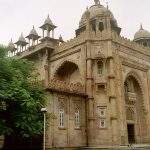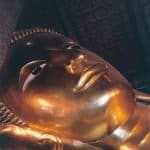Using sign language to find the bus to Pondicherry
After breakfast, I check out at the hotel in Madras and take a put-put to the local bus stop for Pondicherry. A little boy leads me to the right bus, which I would have found by myself also. But inevitably, they cling to you, as I will found out later again during my tour in Pondicherry. In sign language, the driver shows the (still empty) bus will leave in ten minutes. He wants me to pay instantly; the price is only 5 rupees higher than the sum they told me yesterday; that is not too bad.
A minor incident relating to my backpack on the bus
My backpack is too filled for the luggage rack, so I place it next to me on the three-seater sofa. Even when the bus gets full, the conductor does not request me to move my rucksack. Along the way, there is a small incident when an older man and his wife enter. The man apparently takes it for granted that I make room for him. Another Indian passenger stands up for me, and the man drips off. Another one is kind enough to offer his seat. The remaining ride goes smoothly; I enjoy watching the landscapes with palm trees and the typical hectic villages along the way.
Renting a room in an ashram
After 3 hours of driving, I arrive in Pondicherry. At the bus station, an older rickshaw cycle driver offers to bring me to the guesthouse of my choice. He says that the hotel next door is much cheaper. I still want to inquire at the reception of my hostel. According to my travel guide book, it is also by far the best place to stay, at least if you can agree to the conditions. After all, the site is an ashram founded by an enlightened spirit called The Mother. The terms are: no drinks, cigarettes, or (evident) drugs in the guesthouse, arrive before half-past ten, and no visitors in the room. After seeing the room, I decide to stay.

Hiring a put-put driver to take me on tour in Pondicherry
It is two o’clock in the afternoon, so I want to eat something first. While I am smoking a cigarette outside the gate, a put-put driver appears. He wants to take me on tour in Pondicherry and tells me that things are going slow because there are not enough tourists. I ask him his price, and I agree to a one-hour tour; eventually, he will drop me off at the ashram again at half-past ten in the evening.
Learning how to eat with my hands grabbing rice from a banana leaf
First, we eat something in a local restaurant, 16 rupees for a bowl of rice, dal – curry with yogurt, and some cassava (also in curry). No cutlery or plates, but a banana leaf where the vegetables and sauce are scooped up. As I am the only foreigner in this eatery, I look around at how you should eat; you grab some rice, mix some sauce under it, knead it slightly into a pile and just stuff it up. It takes some adjustment, but you get used to it quickly.
The tour in Pondicherry starts in the French part of town

Afterward, my tour in Pondicherry starts. First, we head to the French part of the city; I visit a place where people make paper and then another outlet where metal utensils are offered for sale. Sebastian, my Catholic Indian driver, is always waiting outside. Out of courtesy, I take a look but don’t buy anything. Both venues seem to belong to the ashram of The Mother. It is far too much new age to delight me, and in the back of my mind, I am already trying to think of completing this tour. Together we visit two more churches built by the French.
My driver explains about his enduring life
During our sightseeing, we start talking more and more. Sebastian turns out to be worrying a lot; his house has burned down twice. His sister, brother, and mother still live there. He, 42 years old and single, rents a roof space for 800 rupees per month. Further, on our tour in Pondicherry, we visit a – poorly maintained but calming – botanical garden, a fishing port, and a graveyard – where we also briefly consider the grave of his father, who died 2 years ago.
Visiting a local slum
On the way back, Sebastian asks if I want to see his house. We drive into a slum and arrive at the place. The traces of fire are clearly visible. There are still three walls and a half, and a thatched roof, that’s it. His sister is aloof. The whole scenery looks pretty hopeless. Then we drive to his rental home somewhere nearby. One room on the roof of a small building; here again, a desolate sight: four stone walls and a corrugated iron roof, one lamp, one tap, and here and there some things.
First seeing some temples
To finish our tour in Pondicherry, we visit some temples. It is already dark outside. Sebastian drops me to a Shiva, a Rama, and a Ganesh temple; all three are worth seeing, the first the most, but unfortunately, it is not allowed to take pictures. As it is past 7 o’clock already, I am hungry and looking forward to a beer. Alcohol consumption is no problem here in Pondicherry.
To round up with a decent meal
Sebastian takes me to a local Indian bar where – again – I am the only foreigner. Because I am quite satisfied with his services, I pay for his beer and meal. I eat chapati, masala (chickpeas, meat, and curry – spicy, of course) and also get a piece of well-grilled fish. Later, another stewed fish dish with onions comes for Sebastian, but I get another portion. Good and cheap food, and with a spoon this time, in a dirty bar.

A corrupt policeman with bad intentions
After dinner, we go back to the guesthouse. I want to reward Sebastian well because the tour in Pondicherry he showed me was more than worth the effort. But then a policeman shows up, clearly with ill-intent. My self-rolled cigarette is supposedly suspicious. Then the officer gives me a hand; mine is sweaty, again doubtful, according to the agent. Then he asks what I ate. And because I had a good time, he now wants to have a good time as well and asks me for money. I keep my cool and say that I see no reason to give him money. The corrupt cop exchanges some words with Sebastian and luckily continues his way.







